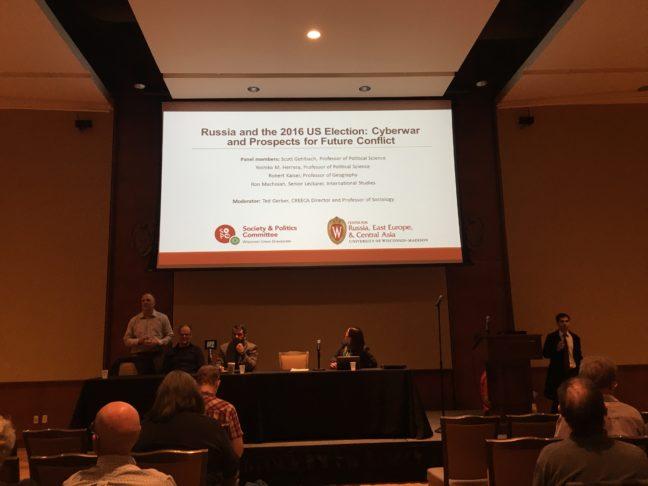In the wake of the U.S. and Russia’s cyberwar, University of Wisconsin experts gathered Wednesday to discuss how these cyberattacks influenced the 2016 presidential election and what they mean for the two countries’ relations moving forward.
On Jan. 6, American intelligence agencies released a report claiming Russia was behind a cyber campaign meant to sway the election in favor of President Donald Trump, said UW sociology professor and Center for Russia, East Europe and Central Asia Director Ted Gerber. Russia was also blamed for cyber-attacks against former Democratic presidential nominee Hillary Clinton and the Democratic Party, he added.
While there is no concrete proof that Russian President Vladimir Putin was behind this campaign, the allegation itself has raised concerns for U.S.-Russian relations.
There could be several reasons for Russia’s intervention in American elections, UW political science professor Scott Gehlbach said. The West meddling in Russian affairs with their democracy promotion programs irked Putin. Putin also blamed the West for the expansion of the North Atlantic Treaty Organization, which increased tensions, he added.
The election was a chance for Putin to “get back” at the U.S., Gehlbach said. While there is no way to confirm this, it is plausible.
“This requires us looking into Putin’s brain, which is a tricky task,” Gehlbach said.
Other reasons for the cyberwar include Russia using this campaign against the U.S. as a “distraction” from political turmoil brewing among its own people, Gehlbach said. Russians were trying to show that U.S. elections were rigged and unfair.
The most alarming reason behind the campaign could be that Russia wanted to infiltrate the American electoral system and elect a president who would be sympathetic to Russia, Gehlbach said.

But the campaign would have no overall effect on the legitimacy of the 2016 election, UW political science professor Yoshiko Herrera said. The hacks could have undermined people’s confidence in the fairness of the democratic process, however, which Gehlbech said Russians were possibly trying to do.
“The rhetoric after the election undermines the democratic process more than the election itself,” Herrera said.
Herrera said the campaign also highlights certain conflicts of interest within the U.S. government and between the U.S. and Russia. She said there is bipartisan consensus that Russia wants to undermine NATO and reduce America’s global influence.
The most “troublesome” factor is that Trump appears to be increasingly adopting pro-Russian policies. This could be indicative of conflict between Trump and his own administration, which poses a “serious threat,” Herrera said.
This, however, is not a signal of trust and support for Russia, but rather is a “strange” response to potential threat, Herrera said. Russia itself is not wholeheartedly embracing this newfound cooperation, but knows some is necessary.
Moving forward, Herrera said more work needs to be done to trace the hackers and any information they have leaked. But she said the hacking itself cannot be expected to stop because of its widespread and often uncontrollable nature.
“Every hacker is going to dream of hacking into MIT’s computers,” Herrera said. “This is going to happen under any U.S. administration and we’re going to have to live with it.”


